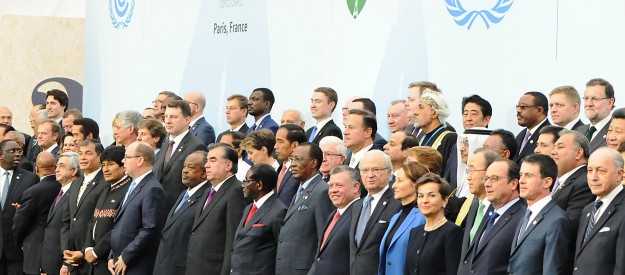"We are losing our attitude of wonder, of contemplation, of listening to creation and thus we no longer manage to interpret within it what Benedict XVI calls 'the rhythm of the love-story between God and man.'"
+ Pope Francis
What comes after COP?

The Feast of Our Lady of Guadalupe is fitting for the final day of COP21, with the imminent formal announcement of what some are calling an historic climate agreement. When Mary appeared to the peasant (now saint) Juan Diego, she came with words of comfort and command for the salvation of the world. She came to bring her son.
With Catholic development agencies and eco-advocates mulling the merits of the draft COP21 agreement, there is cautious optimism that we as a global community are on the right track to keeping our climate in check.
A joint press release by the Catholic development agencies CIDSE and Caritas Internationalis, which were both present throughout the negotiations, credit the presence, activism, and prayers of civil society for pressuring the world’s leaders to, well, lead.
Because of the often loud presence of the faithful, “we now see a reference to 1.5 C degree temperature rise target, a mention of the concept of climate justice and a signal to the fossil fuel industry that its time has come.”
The 1.5 C increase is a goal for a maximum global average temperature rise caused by human contributions to greenhouse gases. This goal had been a line in the sand for many in the Global South, especially during this past week of negotiations. Supported by civil society and the Catholic Church, the 1.5C reference in the final agreement was seen by many as an immense step forward. Some wanted more certain goals for temperature goals, financing, and other issues—which will all be points of discussion in the days and weeks and months ahead.
But for now, there is more than a little cautious optimism.
“For Catholic development organizations working to advocate for a fair and just deal for the world's poorest people,” the Catholic agencies said in their post-COP21 announcement, “the 1.5 C degree temperature rise target will only help achieving climate justice if all countries do their fair share.”
There is, of course, the chance that all countries won’t do their fair share.
And this is where faith is necessary. Not some sentimental faith in an ethereal “let’s all get along” philosophy, but faith in the actual soul-transforming grace of Almighty God, who ever and again seeks to elevate human history. Because without God’s grace, we humans can be a selfish lot.
Running through the heart of this blog since its inception is a message that Pope Francis underscored in his eco-encyclical:
We should not think that political efforts or the force of law will be sufficient to prevent actions which affect the environment because, when the culture itself is corrupt and objective truth and universally valid principles are no longer upheld, then laws can only be seen as arbitrary impositions or obstacles to be avoided. (LS 123).
This means that what the Church offers in her efforts to save the world from ecological and social harms is different than what secular activist groups can offer. While we can and should join the good work of such secular movements, we cannot be satisfied with simply mimicking them. Or worse, of trying to win their favor.
Our role is to bring to eco-activism that which actually transforms the human heart, and so keeps corruption in check. Like Our Lady of Guadalupe, we must bring Jesus Christ to the world—that is, His word and His grace. This must be our mission, as it has always been the mission of the Church.
Much more on all this to come.
For now, let us thank God that we have made some progress—and let us renew our faith in Him so that we can take on what has to happen next.
Photo: COP21 negotiations. Flickr de UNFCCC


















